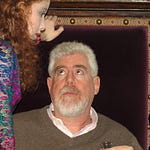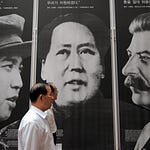Bob speaks with author and scholar Lawrence Weschler, who shares astonishment that The Machine Stops could — from very few data points — extrapolate our present, so paradoxically connected and detached.
* FULL TRANSCRIPT *
TEDDY ROOSEVELT: Surely there never was a fight better worth making than the one which we are in.
GARFIELD: Welcome to Bully Pulpit. That was Teddy Roosevelt, I’m Bob Garfield. This is Episode 7: Back to the Future.
It’s a special episode, featuring not an essay or an interview exactly but a conversation — a literary conversation no less — with author Lawrence Weschler. The subject is a 12,000-word novella called The Machine Stops, and the occasion, for reasons that soon will be apparent, is the Venice Architecture Biennale. This is an abridged version of our back-and-forth for that audience.
Now you may know Ren Weschler from his decades as a staff writer for the New Yorker, or for his dozen-some books on subjects as varied as Chilean torture, Polish liberation politics and his Boswell-ish engagements with such pioneering artists as David Hockney, Robert Irwin and the maker of hand-inked paper-money facsimiles, JSG Boggs. And so much more, because he is a journalist of astonishing scope and erudition, as you are about to ear-witness.
At some points I may interrupt the Venice conversation for a clarifying point. Meantime, for reasons that will also soon be obvious, we will begin not with a description of The Machine Stops, but of Ren reading the first page or two.
WESCHLER:
Imagine, if you can, a small room, hexagonal in shape, like the cell of a bee. It is lighted neither by window nor by lamp, yet it is filled with a soft radiance. There are no apertures for ventilation, yet the air is fresh. There are no musical instruments, and yet, at the moment that my meditation opens, this room is throbbing with melodious sounds. An armchair is in the centre, by its side a reading-desk — that is all the furniture. And in the armchair there sits swaddled a lump of flesh — a woman, about five feet high, with a face as white as fungus. It is to her that the little room belongs.
An electric bell rang.
The woman touched a switch and the music went silent.
“I suppose I must see who it is”, she thought, and set her chair in motion. The chair, like the music, was worked by machinery and it rolled her to the other side of the room where the bell still rang importuningy.
“Who is it?” she called. Her voice was irritable, for she had been interrupted often since the music began. She knew several thousand people, in certain directions human intercourse had advanced considerably.
But when she listened into the receiver, her white face wrinkled into smiles, and she said: Very well. Let’s talk, I will isolate myself. I do not expect anything important will happen for the next five minutes — for I can give you fully five minutes, Kuno. Then I must deliver my lecture.
She touched the isolation knob, so that no one else could speak to her. Then she touched the lighting apparatus, and the little room was plunged into darkness.
“Be quick!” She called, her irritation returning. “Be quick, Kuno; here I am in the dark wasting my time.”
But it was fully fifteen seconds before the round plate that she held in her hands began to glow. A faint blue light shot across it, darkening to purple, and presently she could see the image of her son, who lived on the other side of the world, and he could see her.
“Kuno, how slow you are.”
He smiled gravely.
“I readily believe you enjoy dawdling.”
“I have called you before, mother, but you were always busy or isolated. And I have something particular to say.”
“What is it, dearest boy? Be quick. Why could you not send it by pneumatic post?”
“Because I prefer saying such a thing. I want —”
“Well?”
“I want you to come and see me.”
Vashti watched his face in the blue plate.
“But I can see you!” she exclaimed. “What more do you want?”
“I want to see you not through the Machine,” said Kuno. “I want to speak to you not through the wearisome Machine.”
“Oh, hush!” said the mother, vaguely shocked. “You mustn’t say anything against the Machine.”
“Why not?”
“One just mustn’t.”
“You talk as if a god had made the Machine,” he cried. “I believe that you pray to it when you are unhappy. Man made it, do not forget that. Great men, but men. The Machine is much, but it is not everything. I see something like you in the plate, but I do not see you. I hear something like you through this telephone, but I do not hear you. That is why I want you to come. Pay me a visit, so that we can meet face to face, and talk about the hopes that are in my mind.”
And it goes on from there.
GARFIELD: Well, thank you, Ren. As you in our audience have by now divined, The Machine Stops is a work of science fiction depicting a techno totalitarian state in which citizens from their hexagonal hive quarters conduct their lives almost entirely mediated by an internet called The Machine. And as we'll discuss, it really kind of nails some of the biggest issues we face as Earthlings in 2021, Ren so far so good. Fair description?
WESCHLER: I think that's good. Keep going.
GARFIELD: All right. The Machine Stops portrays a dystopian future society, denuded as will learn of trees and of real human contact, where physicality is not really déclassé, but bred out of the species all together. The inhabitants of this world are flaccid and lumpen and pale and depend on the Machine to the limit to deliver them, not just images on the screen, but through that network of tubes the food and oxygen they need to sustain them.
WESCHLER: They're all living underground.
GARFIELD: Oh, and they're living underground. Stop me if I'm getting any of this wrong, if there's any other additions.
WESCHLER: Something appears to have happened on Earth, on the surface, and everybody's been moved underground and is living in a hive of hexagonal rooms.
GARFIELD: Exactly. So here's the thing. To read The Machine Stops is to immediately think of other fictional techno dystopias from which such a scenario would seem to derive. George Orwell's 1984, written in 1949. and Aldous Huxley's Brave New Worldfrom the year 1932, each depicting authoritarian societies which controlled the population through centralized media and creature comforts to make individuals docile and compliant. But Ren, you stubbornly refuse to call this story derivative of either Orwell or Huxley. Why is that?
WESCHLER: Because it was written in 1909, by E.M. Forster. And it's amazing because we don't think of E.M. Forster, who we associate with those of us who either read it in college or went to the movies, we associate it with A Room with a View, which is a book that came out just before he wrote this, or , which is a book that came out just after. He wrote it in 1909. And as we'll discuss as we go on, it is unbelievable how he nails the current moment. He nailed the current moment even three or four years ago, but after Covid, it completely nails the current moment. It’s, it is absolutely amazing that he would have had this vision in 1909. A few thoughts on that and then we'll go back to the story itself. I've been doing some reading of his biography, in various biographies, and all of them quote this very seminal diary entry he had in January, 1908. So this is a year before he wrote the story. And he's all upset because that morning comes news. Well:
Last Monday, a man named Farman flew a three quarter mile circuit in one and a half minutes.
He's talking about planes, airplanes, the early airplanes.
It's coming quickly. And if I live to be old, I shall see the sky as pestilential as the roads. It really is a new civilization coming. I have been born at the end of the age of peace and can't expect to feel anything but despair. Science, instead of freeing man — the Greeks nearly freed him by right feeling — is enslaving him to machines. Nationality will go, but the brotherhood of man will not come. No doubt the men of the past were mistaken in thinking dulce decorum est pro patria mori — it's beautiful to die for one's country — but the war of the future [this is 1909] will make no pretense of beauty or of being the conflict of ideas. God, what a prospect. The little houses that I'm used to will be swept away. The fields will stink of petrol and the airships will shatter the stars. Man may get a new and perhaps a greater soul for the new conditions, but such a soul as mine will be crushed out.
GARFIELD: He was a hell of an extrapolator.
WESCHLER: Yeah, you can see it going from there. By the way, it reminds me of an amazing passage from Henry James writing to a friend in 1914. In August, 1914:
Black and hideous to me is the tragedy that is gathering and I'm sick beyond cure to have lived on to see it. You and I, the ornaments of our generation should have been spared this wreck of our belief that through the long years we had seen civilization grow and the worst become impossible. The tide that bore us along was then all the while moving to this, it's Grand Niagara. Yet what a blessing we didn't know it.
GARFIELD: OK, as threatened, popping in here after the fact to point out what Ren and I failed to remind the audience — which is that Henry James was responding to the outbreak of World War I and the shattering realization that evolved societies can devolve in the worst way — which he simply did not see coming.
WESCHLER: Interesting thing there is that in many ways Forster did. And for that matter, it was this fantasy that both Foster and James had that, this was a time of civility and so forth, completely occludes what was, for example, taking place in Africa and in imperialism all over the world and that wasn't going to lead directly to World War I. By the way, one other thing to say about 1909 before we go on is, 1909 is not just an average year. 1909 is the year that Cubism is invented. And in some ways, I would argue and we can go into this later on, that the Cubists, too, are having this sense of the limitations of things and how one needs to think differently, to think in new ways and how to evade the totalitarianism of one point perspective and so forth.
GARFIELD: You could say that cubism is extrapolation itself, so they share that in common. You mentioned the air travel. I mean, this is just a couple of years after the Wright Flyer got a few feet off the ground at Kitty Hawk. And he's imagining transcontinental travel, which is just one element of just the jaw dropping list of prescient observations. You referred to the Covid lockdown. Everybody is in absolute isolation. They see other people only through that screen, that blue lighted screen in their hands, which is like a smartphone or an iPad.
WESCHLER: They've all gone flaccid and flabby. There's an amazing passage, by the way. He does a flip on several things. He does a flip on eugenics, that in this society, any babies that are born that seem to be strong and athletic are immediately eliminated. This is just the opposite of the fantasy of eugenics at that time. And they're eliminated because, you know, what's the point? It would just make them uncomfortable and it would be embarrassing for everybody else. So they are killed at their very births.
GARFIELD: Yeah, and that will become a plot point because they've culled physicality from the species. But the son who we’re introduced to in the first passage will actually cultivate his muscles for what will be his escape to the surface.
WESCHLER: Right.
GARFIELD: Just a couple more things Ren. There's the environmental devastation that I don't know that others anticipated in 1909, but the air is despoiled, the trees are gone. We are forced as a species underground because it is uninhabitable above.
WESCHLER: One point where he says that, for our comforts, we despoiled the entire planet and made it unlivable, some phrase, just because we wanted to be more comfortable. Amazing phrase in 1909.
GARFIELD: There is also, and again, this was, this was long before globalism and the interconnectivity of the whole world. Distant places were distant and discrete. But what he somehow envisioned was this vast cultural homogeneity as a result of globalism. Every hexagonal hive around the world was the same and all of the media content was the same, and we all lived the same experience.
WESCHLER: He has this great line. What's the point of going to Beijing, or Peking as it's called, when when you get there, it's going to look exactly like your own town. He has malls, he has FedEx. He has this great line where he says, we've solved the problem of people having to go places to get things. Things come to people. That solves that. No need to go outside. No need to leave your room. He has this very funny thing about why one of the reasons that the world was despoiled was because all the trees were cut down for pulp, for books.
GARFIELD: And newspapers.
WESCHLER: And he has a thing that's basically Kindle. And there are no books anymore. There's basically this plate. You can read any book you want on that plate. There is one book, which is the manual for the Machine basically, that's achieved kind of the role of the Bible almost.
GARFIELD: Yeah. And there's this recurring theme in the book about the deification of the technology and the ongoing debate between the mother Vashti and the son Kuno about whether they have actually defaulted to the religion that they're nominally not permitted to have in this society. There's one thing about that iPad or smartphone, the image that is at the very beginning of the story — it comes just about where you left off.
WESCHLER: Right. Right.
GARFIELD: And I wanted to read this because it's describing the low resolution of the screen.
WESCHLER: And we are not unaware of how meta this whole conversation …
GARFIELD: Yeah, especially if your Zoom feed is pixelating right now. But it said:
She could not be sure, for the machine did not transmit nuances of expression. It gave only a general idea of people, an idea that was good enough for all practical purposes, Vashti thought. The imponderable bloom declared by a discredited philosophy to be the actual essence of intercourse was rightly ignored by the machine, just as the imponderable bloom of the grape was ignored by the manufacturers of artificial fruit. Something good enough had long since been accepted by our race.
It's an astonishing observation. And you don't know whether he's talking about the Uncanny Valley, by which animated figures and robots can be seen not to be human because there's a certain light missing from their eyes. Or whether it's a society wide kind of Aspergers where you're blind to nuance of expression. Is it just technological, is it just that there aren't enough pixels on the screen. Or, and this is what I think, is the loss of resolution, the just good enough, a metaphor for the loss of rich experience and rich inquiry and the sense of mystery which the society has forsaken? What the hell is the imponderable bloom, Ren?
WESCHLER: Well, I'm reminded of when you go to museums and you see those — using the example he himself uses — the paintings of still lifes, the Dutch still lifes. And they do have that incredible, that little powdery dust on the plum, for example.
GARFIELD: Mm hmm.
WESCHLER: That is the essence of a plum. And yet you don't — when you go to the store, the supermarket, all the plums have been polished — and so you don't see that at all. For that matter, I'm reminded of, in that context, John McPhee's book, Oranges, in which he asks the question one morning at his breakfast table, why does the orange juice, his packaged orange juice from Florida, taste the same every single time? And that became a whole book of the entire industry, the superstructure of creating oranges and everything that has to happen to make sure that they stay exactly the same. God forbid you should have a separate kind of taste one morning from the other morning. You would, of course, take it back to the supermarket and complain, you know, you would become like one of the satirical characters in this story. I mean, that's how you would respond to it.
GARFIELD: I'm no longer surprised, now that you mention the orange thing, which I had been unaware of, that John McPhee also wrote 60,000 words on rice.
WESCHLER: Yeah, yeah. Well, that was the good old days at The New Yorker.
GARFIELD: Those were the days. And you were in the thick of The New Yorker.
WESCHLER: I was in the thick of the rice.
GARFIELD: Them days. I just wanna, if I had E.M. Forster here, I would say to him: I got news for you, dude — I grew up in the 50s and 60s and we had artificial grapes that were made of glass and they had some sort of, I don't know, latex around them. And they looked really, really foggy. You know, they had that misty look to them. So we solved that problem motherfucker. You know …
WESCHLER: I'm sure the two of you would have gotten along great.
GARFIELD: Oh, I have no doubt. So, Ren, obviously it's jaw dropping that he was so prescient in so many ways.
WESCHLER: There's a few other ones that I wanted to point out. One of the things that's absolutely amazing is that Vashti's job is essentially she's an influencer. And when she's not influencing, she's a TED lecturer. She basically gives these lectures that everybody all over the world, because she has thousands of friends, that's basically what she has, tune in to her lectures and they are 10 minutes long. They are never more than 10 minutes long. And we were talking a bit about the standardization of the world. All beds are exactly the same size and are the same everywhere. It's basically the IKEA of the world. You realize that for him, this is dystopian and for you this is your life.
GARFIELD: There's one big difference between like TED culture and The Machine Stops culture, and that is that these lectures, they mustn't, they mustn't contain new ideas.
WESCHLER: Exactly.
GARFIELD: It's a beehive. It's also a cow stomach, where you’re allowed to digest in ...
WESCHLER: Ruminate, as it were.
GARFIELD: … different chambers, but you're not allowed to do anything new.
WESCHLER: Right.
GARFIELD: And again, early in the book, there's something I find astonishing. Can I read one more passage?
WESCHLER: Yeah, yeah. Do, do.
GARFIELD: In the very first pages, the son is talking to his mother, whose job is to lecture about stuff that people already know. And he talked about his experience when he was on one of these airships of seeing stars take a familiar shape. He says:
Do you not know four big stars that form an oblong and three stars close together in the middle of the oblong and hanging from these stars, three other stars?
No, I do not, she says, I dislike the stars.
But did they give you an idea?
How interesting. Tell me.
I had an idea they were like a man.
I do not understand.
The four big stars are the main shoulders and his knees. The three stars in the middle are like the belts that men wore once, and the three stars hanging are like a sword.
A sword?
Men carried swords about with them to kill animals and other men.
He had reinvented the wheel called constellations.
WESCHLER: Orion, in particular.
GARFIELD: It had vanished from humankind, the notion of looking at the stars and marveling and imagining what images they conjured. This was, this was a revelation. This is how far the society had devolved, that they lost track of the very stars.
WESCHLER: And there is the wonderful phrase at one point where Forster says that above them, night was turning to day, day was turning to night. They were completely unaware of the cycle, even that cycle. At one point she does, Vashti does decide to go and they have these airships they are called. They're like kind of like planes, kind of like balloons — it's not quite clear what they are. But they're traveling, and this description of what it is like being on the airship:
It was night. For a moment she saw the coast of Sumatra, edged by phosphorescence of waves and crowned by lighthouses still sending forth their disregarded beams. These also vanish, and only the stars distracted her. They were not motionless, but swayed to and fro above her head, thronging out of one skylight into another, as if the universe, and not the airship, were careering. And as often happens on clear nights, they seemed now to be in perspective now on a plane now plied tear beyond tear into the infinite heavens, now concealing an infinity of roof limiting forever the visions of men. In either case, they seemed intolerable. Are we to travel in the dark?, called the passengers angrily. [In other words, in night? And what the hell is this? What are we doing?] And the attendant who had been careless generated the light and pulled down the blinds, a pliable metal. When the airships had been built, the desire to look direct at things still lingered in the world. Hence the extraordinary number of skylights and windows and the proportionate discomfort of those who are civilized and refined. Even in Vashti's cabin, one star peeped through a flaw in the blind, and after a few hours of uneasy slumber, she was disturbed by an unfamiliar glow, which was the dawn.
She's furious that there's a rip in the curtain that is allowing this stuff through. Close it, close it. All ideas have to be, at very most, original secondhand and preferably third or fourth hand. And that's all the discourse that's going on.
GARFIELD: Hold on. Now, on the subject of intolerable, dude, keep reading because something happens between her and the flight attendant.
WESCHLER: Yeah, that's fantastic, too, yeah:
People are almost exactly alike all over the world. But the attendant of the airship, perhaps owing to her exceptional duties, had grown a little out of the common. She had often to address passengers with direct speech, and this had given her a certain roughness and originality of manner [originality being a very bad word]. When Vashti swerved away from the sunbeams with a cry, she behaved barbarically. She put her hand out to study her. “How dare you?,” exclaimed the passenger. “Vashti, you forget yourself.” The woman was confused and apologized for not having let her fall. People never touched one another. The custom had become obsolete, owing to the Machine.
Welcome to Covidland.
GARFIELD: Yeah, the 12:44 is coming in right on schedule.
WESCHLER: Right, there it is, outside.
GARFIELD: A society denuded not only of trees, but of touch, of human contact. So we've established clearly that Forster was prescient beyond beyond belief, right? But the other thing that's beyond belief is that the person who's writing this is E.M. Forster.
WESCHLER: Right.
GARFIELD: Because E.M. Forster, A Room with a View, Passage to India, where at least at first glance, the issues that he's concerning himself with are very, very different, in class division and so on. So my question for you is, are they really that different?
WESCHLER: Well, there’s that.
GARFIELD: Is there a line between A Passage to India and The Machine, you know, styles?
WESCHLER: Well, a couple of things. First of all, in terms of the immediate background, according to some of the biographies I've been reading, he wrote it, he said at the time, as a counter to some of H.G. Wells’s most recent work at the time, which was utopian — where H.G. Wells was imagining actually a happy outcome, where the world, where all these machines were taking care of all these things and so forth, and he was not at all sure about that. So, he also, somebody said, he was writing an encounter to an Oscar Wilde line that he had quoted at one point, who in 1890 — so that would have been 20 years before this — had written this is Oscar Wilde, the Oscar Wilde of Art for Art's Sake, as:
… we become more highly organized, the elect spirits of each age, the critical and the cultured spirits, will grow less and less interested in actual life, and will seek to gain their impressions almost entirely from what Art has touched.
In other words, that is a different kind of utopianism, where you no longer have to deal directly with life and so forth.
GARFIELD: Well, you just described Wilde’s actual life because, you know, I think probably into the 20th century, well into the 20th century, art was the stuff of aristocrats.
WESCHLER: Yeah, yeah. And so that in turn, of course, aristocrats and bohemians — that great line of Kurt Vonnegut's, that that art is a conspiracy between artists and rich people to make poor people feel stupid
GARFIELD: (laughing)
WESCHLER: But indeed, I think Forster is very, elsewhere, is very focused on partly the comforts of a certain layer of bourgeois life. But also the underpinnings and the way that there is beginning to be this growing polarization of wealth, you might say — we are in the Gilded Age after all — and the terrible way in which servants and so forth are being treated. He's quite sensitive to that. And oddly enough, one of the things that's interesting here is that the dystopian society has had a solution which is making everybody live in beehives, you know, and so that that class culture has disappeared, but in a kind of dystopian way. I think, though, that some of those passages, the passage of the dawn in Sumatra and the lighthouse, that's pure E.M. Forster, A Passage to India. I mean, this extraordinary sensitivity to the tactile quality of experience. Especially as opposed to the everydayness of most people's lives, his heroes have these moments, these epiphanies.
GARFIELD: To the textures, to the smells, to the colors, right, of different cultures — the antithesis of the homogeneity.
WESCHLER: You go to Beijing because Peking is different. You go to Delhi because Delhi is different. You go to that cave because, good Lord, is it different than something you would have experienced at home?
GARFIELD: That's something else he nailed too, because, you know, increasingly Shanghai is Los Angeles or whatever.
WESCHLER: Yeah. And by the way, Los Angeles is Shanghai.
GARFIELD: Yes, that's right.
WESCHLER: It's just this remarkable thing to come upon and to come upon it now. So part one is basically this, brings out this world. In part two, there's three parts, part two — in what in one sense is the climax of the story — is how Kuno not only is sacrilegious in that he doesn't honor, he says things that, Be quiet, don't say those things. The machine is listening. You know, the machine is our benefactor.
GARFIELD: Popping in again, because I also failed to notice this when Ren raised it, but the idea of the Machine is listening. If this were Orwell, or Huxley, or Ray Bradbury, the machine would have been listening like an electronic Stasi, like an omniscient security state — which is not quite the case in Forster or even in our own surveillance society. It’s not eavesdropping per se. Yes, in 2021, the Machine does know, because we surrender data willy nilly, and our every click and keystroke are recorded and we spill our guts on social media for eternity. Forster somehow knew that the machine would somehow know. And so Kuno tried to explain to his mom.
WESCHLER: And he’s saying, no, I want to get out. And she says, well, there's no way to get out. The only way to get out, you take the train to the air thing and then you can take airships but you can't go on land, you just can't go on the land. And he says no but I figured something out. And he has this amazing description of, he — well, as you say, he began exercising, which was like completely crazy. He turned off all the stuff and just would do pushups and so forth to get stronger and stronger because, and then he has this extraordinary line, by the way, let me see if I can find this, this amazing line about what we've lost: We have lost the sense of space. We say space is annihilated. That's from the phrase that the telegraph had annihilated space and time, that it used, when the telegraph and the telephone and eventually email come online, the feeling was that space and time — where it took a long time for a message to get from one place to another, you know, and so forth — had been annihilated by by this incredible thing. Initially, the telegraph or along with the telegraph, exactly along with the telegraph, is the train system because the trains need telegraphs to set up all the signals and so forth. And they were exulting at the annihilation of space and time. Which reminds me, by the way, some other time we should have a conversation, if you will, if you enjoy these conversations, about an amazing book by Wolfgang Schivelbusch called The Railway Journey, in which he goes back and looks at what people's experience of railway's was when it first happened. And he describes people are suddenly going six miles an hour, seven miles an hour. And universally, the letters that everybody's writing each other is about the G forces on their bodies. They're being hurled back into the seat. You know, this is, everybody has this same experience.
GARFIELD: Not the soot in their teeth, but but that thrill ride of seven mph.
WESCHLER: Right. Anyway, so he goes on:
We say space is annihilated, but we have annihilated not space, but the sense thereof. We have lost a part of ourselves. I determined to recover it. And I began by walking up and down the platform of the railway outside my room, up and down until I was tired and so did I recapture the meaning of near and far. Near is a place to which I get quickly on my feet, not a place to which the train or the airship will take me quickly.
He's walking, he walks farther and suddenly one day, he comes upon this little pile of rubble on the thing and he looks above and he realizes this must have been when they were building the hives. There must have been a tunnel that went through here up to the, up to a vertical tunnel. And this is left over from the building. And he kind of scratches away and he suddenly finds himself in a tunnel. And he's saying to his mother, there was a ladder. He opens it up and there's this little thing and it goes way straight up, and he says:
There was a ladder made of some primeval metal. The light from the railway fell upon its lowest rungs. And I saw that it led straight upwards out of the rubble at the bottom of the shaft. Perhaps our ancestors ran up and down it a dozen times daily in their building. As I climbed the rough edges, cut through my gloves so that my hands bled, the light helped me for a little, and then came darkness and worse still silenced, which pierced my ears like a sword. The machine hums. Did you know it? Oh, that its hum penetrates our blood and may even guide our thoughts. Who knows. I was getting beyond its power then I thought the silence means that I am doing wrong. But I heard voices in the silence and again, that strengthened me. He laughed. I had need of them. The next moment I cracked my head up against something.
And he's bumped up against the top and eventually gets out. And there's this amazing moment when he is hurled out of, the air pressure hurls him out into this bowl of grass and the sunshine and so forth. George Lucas and Walter Mirch in 1971 made a film called THX 1138 about an incredibly disposed dystopian world in which everybody is living underground.
THX 1138 soundtrack
There has been some kind of calamity on the surface. Everybody is told they can't go on the surface. There is a machine that is in control of everything. And there is Donald Pleasence and Robert Duvall and so forth. And Robert Duvall suddenly decides that he wants to escape. And the climax of the film is his escape. And I just want to show this to you, because the climax of the story I'm going to tell you is that neither of them were aware of The Machine Stops when they wrote and they made this film.
THX 1138 clip
It's absolutely staggering. Talk about a weird echoes, and in fact it was Walter Mirch who eventually first showed me The Machine Stops. He says, look at this thing. We didn't know about this. It occurs to me that it also has echoes of the great Chris Marker film from the French New Wave La Jetée, where society is underground. There it's not a tunnel that you go through, but there's some time travel stuff and they keep on sending the character back in time, and he is walking around Paris. And the wonderfulness of the life beforehand — again this is a theme that keeps coming up. But as far as I know, it first shows up in The Machine Stops, in its kind of purest form.
GARFIELD: So in this film, the reward for escaping to the surface is kind of splendor. And going back to the extraordinary prescience of The Machine Stops, I think the reward is slightly different. We've all experienced, through Covid, isolation — I believe, a kind of loss of proprioception of time. We don't feel like we have purchase on our lives anymore. We can't quite get a grip on the past and we certainly have trouble envisioning what six months will be like or, you know, in some cases six days. And it's a distracting sensation of just not knowing where you are, which I think is more or less the definition of proprioception, having a sense of where your body parts are. But in this society, that Forster’s talking about we, you know, we are completely atrophied. There is no human touch. Light and sound is all controlled by the machine. And we can't fix ourself based on the stars. All of humankind has lost its sense of place and time and self. And that was, I believe, the son's reward for getting to the surface. Maybe we should withhold the consequences of his decision.
WESCHLER: Let's withhold that. But just note that there's a whole part three. And without going into too much detail, but it's absolutely fascinating. The machine begins to break down. And it is the most, it breaks down in absolutely the ways it breaks down for us, you know, but we can imagine it continuing to breakdown more and more. Suddenly the air begins to get staler, you know, and the food isn't so good. And there are moments where the iPhone's not working and and so forth, that it kind of climaxes.
GARFIELD: I'd like to ask a question, and I'm doing this for a couple of reasons, one, out of genuine curiosity and another for having a natural ending to the podcast version of this. And that is Ren, what have we learned?
WESCHLER: I guess this isn't so much a learning as an awakening. You know, I hope that this story wakes us up to the way we've been sleepwalking. I mean, in some sense, if the fantasy of Kuno climbing those stairs allows us — in the short term about Covid, to imagine what it might be to climb out of Covidland — but more importantly, to understand that Covid is just a metaphor in some sense, notwithstanding all the actual damage it’s done of what's coming and what’s coming more and more and more. And for God's sake, wake up. And engage or, in Forster’s words, only connect. Break down the hive walls. And for an architecture biennial, break down the goddamn hive walls.
GARFIELD: All right, we’re done here. What you have just heard was an abridged version of my conversation with author Lawrence Weschler, as part of his Mr. Weschler’s Cabinet of Wonders series for the 17th Venice Architecture Biennale. If you like what you’ve heard here, do please venture beyond our Great Paywall of Booksmart to be a paid subscriber to our offerings, including the works of professors John McWhorter and Amna Khalid in their respective podcasts Lexicon Valley and Banished. You’ll get longer form interviews, access to our hosts and, in my case, my weekly text column — which is, let’s just say, “uncompromising,” because that sounds better than “indelicate” or “brutal.” Now then, Bully Pulpit is produced by Mike Vuolo and Matthew Schwartz. Our theme was composed by Julie Miller and the team at Harvest Creative Services in Lansing, Michigan. We had technical help in Europe for this episode from Adrianos Efthymiadis. Bully Pulpit is a production of Booksmart Studios. I’m Bob Garfield.














Share this post